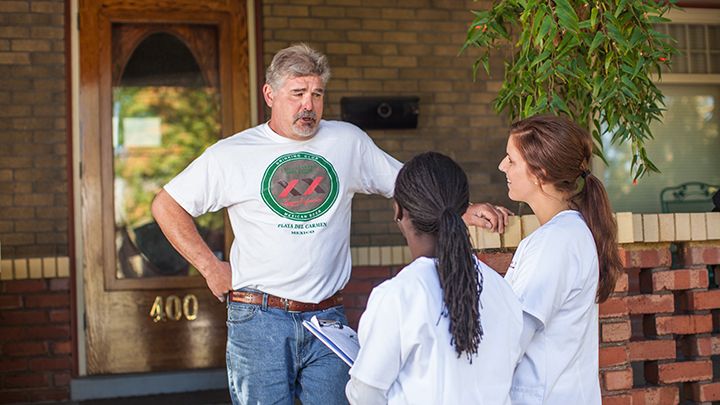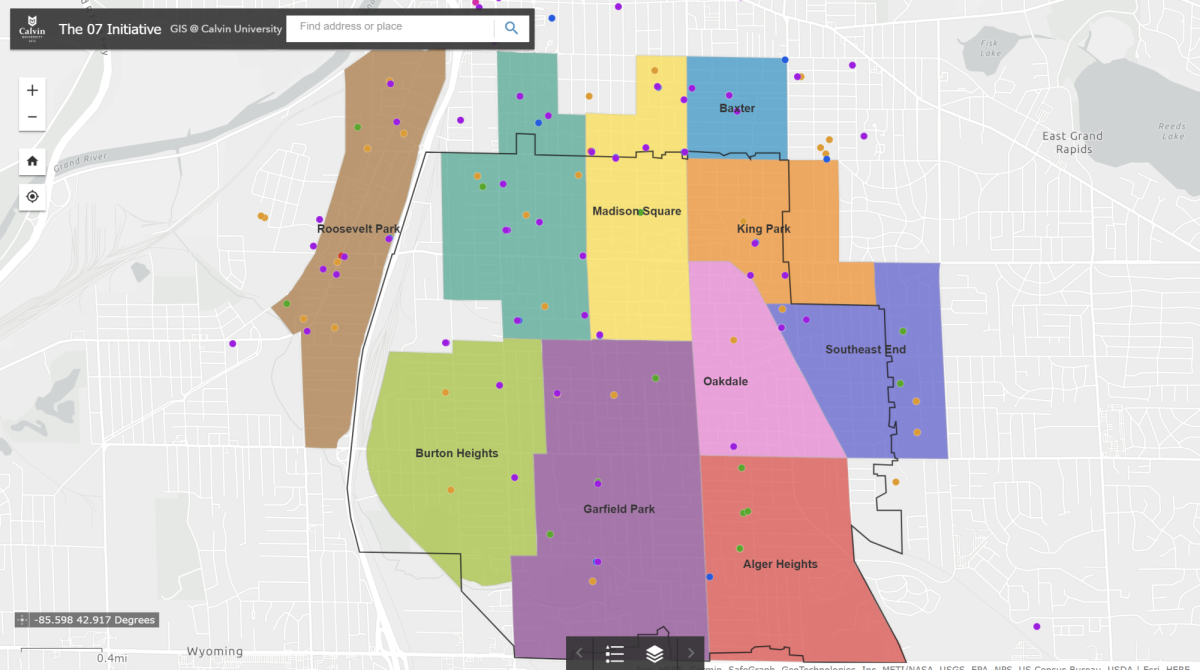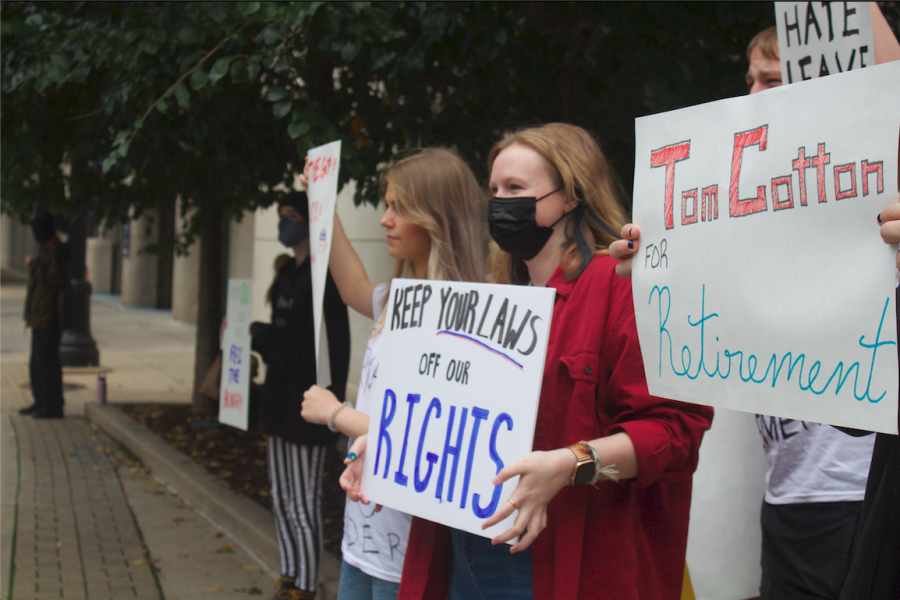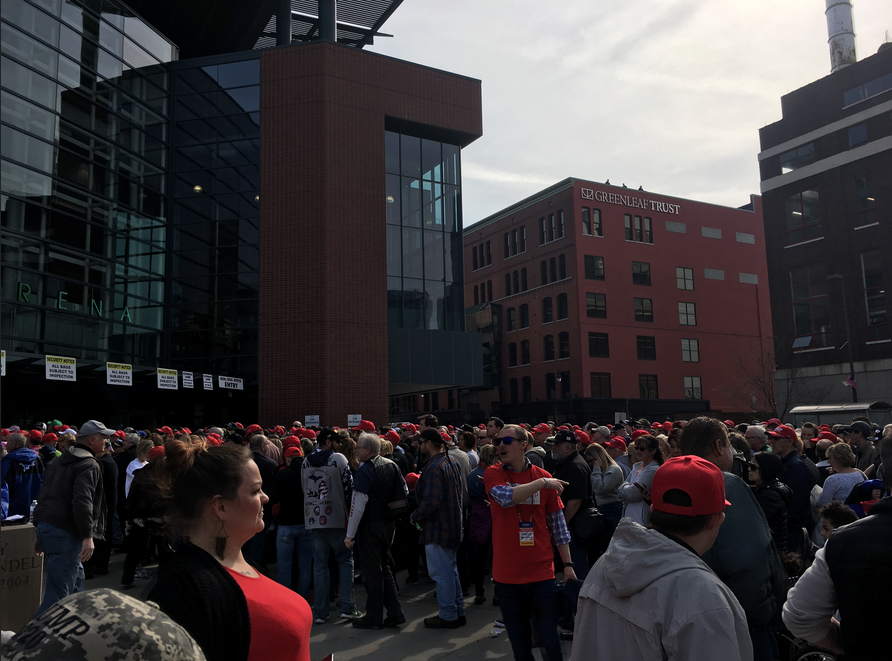Going beyond the classroom and hospital, Calvin nursing students invest in local neighborhoods through placements in the community.
First semester juniors and second semester seniors are placed in one of four placements in the Baxter/Madison, Creston/Belknap, Heartside or Burton Heights neighborhoods.
The program exposes students to practice methods in diverse environments with a focus on health prevention and education.
Nursing students complete their community placement in the same community for both years, enabling them to form a deep understanding of the neighborhood and the people who call it their home.
Each community is unique in its demographics, access to affordable health care and services provided by health professionals in the neighborhood.
The Baxter/Madison community focuses on the health education of children and elderly adults, while the Burton Heights neighborhood is home to many Spanish-speaking individuals and is culturally diverse.
Students working in the Creston/Belknap neighborhood provide health education for the entire community, and the Heartside neighborhood is home to a large homeless population, where students pay close attention to the impact on the environment on an individual’s health.
In addition to their work with clients in the community, students integrate their experiences in the community into the classroom and complete community health evaluations, studies and research guided by their professors.
In their placements, juniors teach community members about health-related topics such as blood pressure and nutrition, provide basic health screenings and distribute flu shots, shadow nurses in community health clinics and provide a health assessment for a resident of the neighborhood.
Seniors implement a variety of preventable health programs, lead health education initiatives, perform personal health evaluations for members of the community and collect information and data for community-based research.
While working in a community setting is embedded with unique challenges, the ability to form meaningful, long-term relationships with clients and learn in a different context, which many cite as instrumental in their nursing education.
As senior Luke Bosscher reflected, “Learning how to care for and interact with different types of people is so important as a nurse to understand different backgrounds and work with what they know to better help them.”
Looking back on their experiences partnering with a community in Grand Rapids, six senior nursing students shared the insights they have gleaned from their community placement and the impact it made on their nursing education experience and future careers.
Lyndsay DeGroot:
During my clinicals in Heartside, I have realized that I automatically put myself in the middle of my universe, fixing my eyes on my own wants and needs rather than on God. The residents of Heartside are shining image bearers of God, and walking alongside them has reoriented my gaze toward Christ in a way I have never experienced before.
They taught me so much through their stories, and I am so thankful for their willingness to share. I am continually reminded that this life I have been given is a gift, and it does not belong to me. The Lord is the one who fills my lungs with his breath and sustains and provides for me.
The experiences in the Heartside neighborhood have been an avenue of opening my eyes to see those around me as more than “homeless people.” Rather, I finally realized that each person has a story within the larger narrative of God’s story of sacrifice, love, grace and redemption.
We must look into the eyes of each person we meet and see Christ standing behind them. We cannot simplify homelessness as a problem of “lazy people” who don’t want to work. We need to have empathy, compassion and humility in listening to their stories; courage, diligence and respect in minimizing stigma; and increasing empowerment and valuing the beautiful gifts that each person in the community offers.
Paige Noordyke:
The cool thing about our community rotation is that we are in our specific community sites our first semester of nursing school and our last semester of nursing school. We do many similar things, but it feels a lot different.
We do a lot of blood pressure and blood sugars screenings, many at food pantries in the neighborhood. It is funny to look back and remember how nervous I was for those first few screenings compared to how comfortable I was and how natural it felt the second time around.
The experience as a whole definitely opened my eyes to the health care disparities that are right around the corner and the small things that can be done that make a big impact.
One big challenge in community nursing is being flexible. Nothing ever goes how you imagine so it is important to go with the flow.
One of my best memories was leading a support group for women with anxiety and/or depression. The women were super sweet and gave a lot of positive feedback on the group and how helpful it had been so that was the most rewarding experience.
Lauren DeGroot:
I am a senior nursing student and I’ve had the joy of being in the Heartside (downtown) community for two clinical rotations. Reflecting on my experiences, I think that watching Heartside residents struggle with alcohol and drug addictions, homelessness, poverty and lack of access to essential resources has been one of the greatest challenges.
Witnessing this brokenness is humbling and heart breaking. Amidst the challenges and brokenness, I have intimately encountered God. I see his love and experience his joy through the residents who overcome many barriers to lead amazing lives.
Participating in our community walking program and hearing residents’ stories has been one of the most memorable experiences. Their stories are nothing less than inspiring and honest. Through all of my experiences, I have found that Heartside residents do not need me to list 20 resources, name a new medication or find them a place to live.
Residents need me to be me — a broken image bearer, listening to and dwelling with broken image bearers. I learned that “making a difference” is not always defined by starting new programs or reaching out to thousands of people. Rather, Christ makes a difference in our lives when we love and serve each other through small, faithful acts of love.
Allie Buell:
I have absolutely loved working in the Baxter/Madison community through Calvin nursing over the past two years. I think often people look down on community nursing as something you do when you get tired of the fast-paced hospitals and need a break.
I thought that too at first, but instead it’s opened my eyes to both the need and hurt of the people in that community and their strengths and joys. Community nursing taught me that in order to care for the least of these, we need to put ourselves in places where we’ll run into them.
I’m so grateful I go to a school that values that so much that they put us in those places for two semesters and teach us love, justice and how to listen. I hope those practices will carry over into my nursing practice.
Marta Boot:
Through working in Heartside, I’ve learned a lot of patience and diligence. It’s sometimes hard to work in the community because things change all the time and you have to be flexible.
In the hospital, you see people for a couple days, and then they’re gone, but in the community you can see the same people and build relationships with them and have collaborative action.
Recently we’ve been doing the walking program in Heartside, so every week we’ve been walking with the same people. Most of them have never done anything related to exercise, so we created a program so that they can take part, and this past weekend we walked the Fifth Third Riverbank Run. A lot of the people are really inspirational.
To see what they’ve gone through to where they are now, it’s pretty amazing. One lady we’ve been walking with had hit bottom and then started connecting with our professor, Suzan Couzens, and she now has a support system and is planning on going back to school to get her GED and CNA. In that way, she’s empowering people.
I also love volunteering to do foot spas at LaGrave, where we wash people’s feet who are homeless. When you’re down lower than someone, you get that feeling that you are on an even playing field.
Luke Boersma:
I really enjoyed my community placement in Heartside because you are able to build relationships with the people you serve, working together, learning from each other. I would like to work in a community setting in the future.
You do have to roll with the punches and realize that these people don’t have the same situations that we do, and not having resources makes it harder to be on time for things, to give one example.
I do like the clinical aspect of the hospital, but working in the community is more about prevention and health promotion, which I’ve really enjoyed.
Doing the foot spa, where we washed the feet of the people we served, was one of the first things we did junior year, and I felt like that was very symbolic of what we were about to embark on the next two years.
The experience gave me a wider perspective of Grand Rapids as a whole. The community we’re working in is not part of the Calvin bubble and that can be a beautiful thing.
A Bill Nye quote that I’ve been using a lot this semester is, “Everybody you will ever meet knows something that you don’t.” In the field of nursing, or any field that you go into, it’s important to humble yourself and realize that you don’t know everything.










